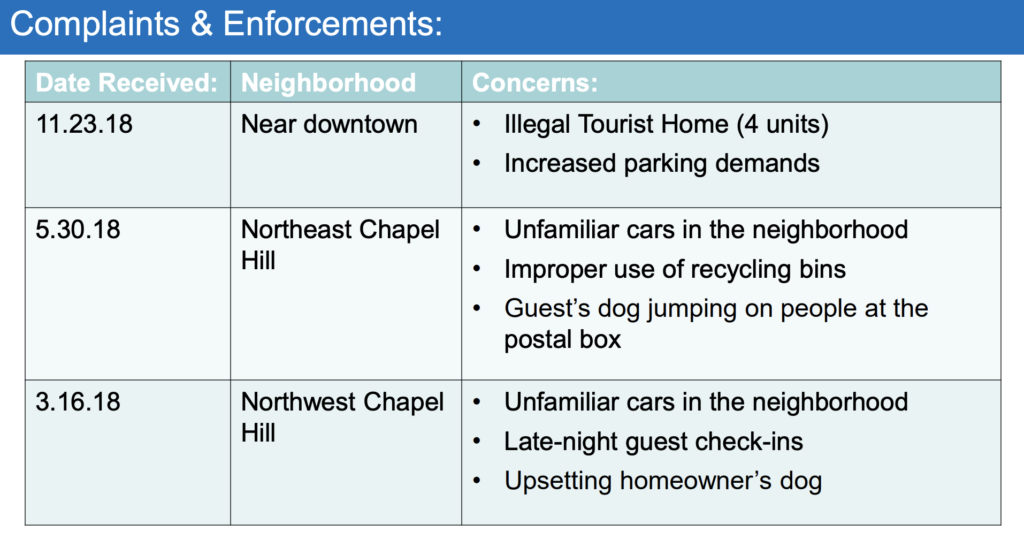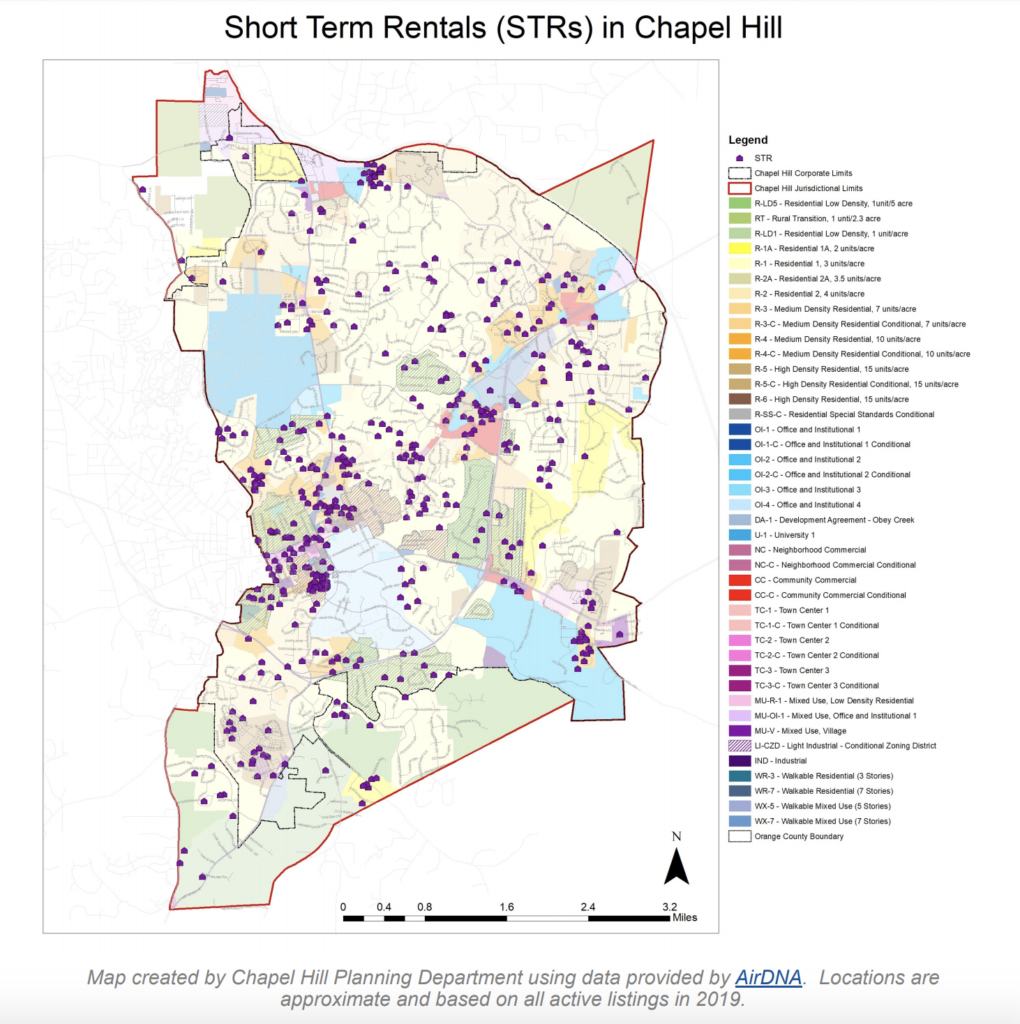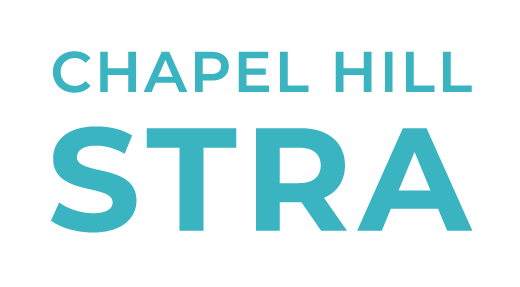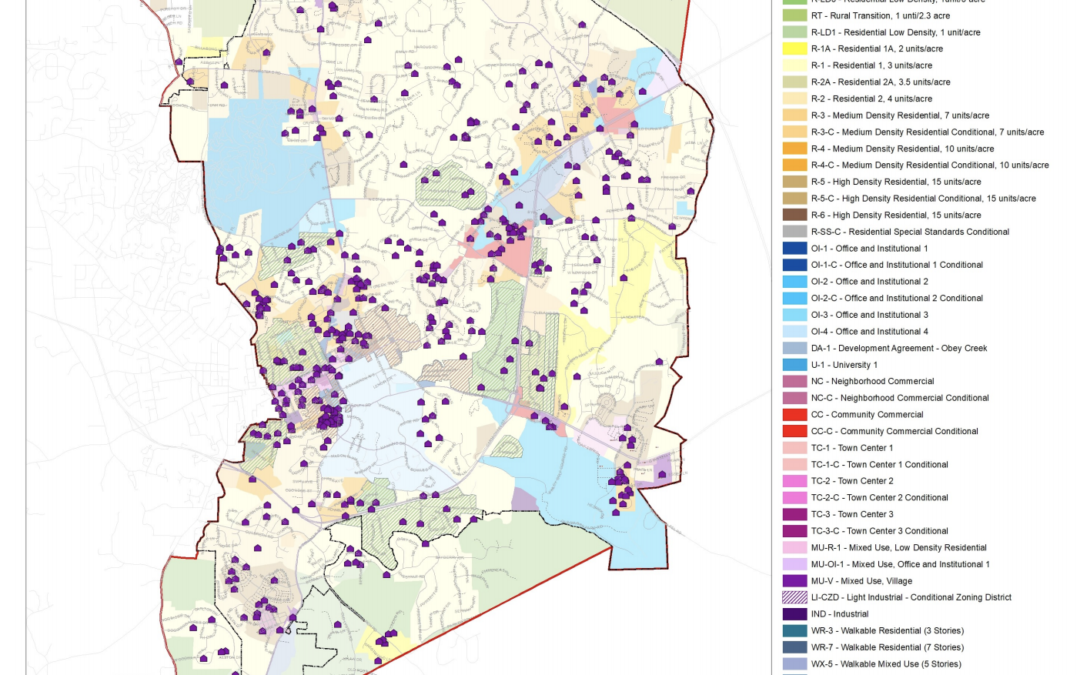On November 6, the Chapel Hill STR task force held its second of four meetings. The group approved the minutes from the first meeting, available here.
Reminder: Per advisory board rules, task force members and members of the public who attend the meetings must abide by non-attribution when reporting on the meetings, meaning we cannot attribute specific comments to specific people. The CHSTRA will uphold this rule. Therefore, the only way for members to get complete insight into meeting discussions with specific comments made is to attend the meetings.
Planning Department Presentation
During old business, the Planning Department made a presentation to answer questions and requests from the previous meeting, including a confirmation of the group’s charge from council, current LUMO regulations for STRs, additional STR statistics, and the complaints the town received that triggered the town to look into zoning.
The complete presentation can be viewed here.
Highlights from the presentation
The council confirmed the charge of the task force to focus on non-owner occupied STRs, aka investor properties. Download Resolution 2019-09-11/R-8 here.
They and the Planning Department also confirmed what our charge is not:
- Hosted rentals of room/accessory dwelling unit as part of a primary residence
- Whole house rentals when the primary resident is not on site
- Final determination on regulations (subject to Council action)
- Recommendations about regulating parking, garbage, and noise (to be addressed by Police and Code Enforcement)
The Planning Department provided details of the 3 complaints the town received related to STRs, screenshot here:

The Planning Department provided a handout covering the existing LUMO definitions written before STRs as we know them today, along with which zones the (outdated) property types are allowed in. Note: STRs today don’t fit these definitions, so we are not trying to fit them into old regulations. Whatever new ordinance the council adopts will override the existing zoning for these properties.
The same handout also provided definitions for common terms uses in STR discussions, such as hosted and unhosted shares, dedicated vacation rental, designated responsible party, and hosting platform.
The Planning Department also provided a map overlaying STR location data from Airdna with the town zoning map, available here. Screenshot provided below.

Editor’s Note: The town does not (or should not) have STRs’ exact addresses. The locations on the map above are provided by AirDNA, which provides approximate locations scraped from OTAs. However, the town is considering a company called Host Compliance for ordinance enforcement. Host Compliance will provide exact address information which it obtains by doxxing. Doxxing is searching for and publishing private or identifying information about a particular individual on the Internet. This article explains how companies like Host Compliance are essentially paid by cities to dox STR owners: The People Paid to Dox Airbnb Addresses
The Planning Department provided a timeline of ordinance development:
- September 11, 2019: Council adopted a public engagement strategy that included creating a task force
- October 2, 2019: Council appointed members to the task force
- October 16, 2019: Task Force Meeting
- November 6, 2019: Task Force Meeting
- >>>>> WE ARE HERE <<<<<<<
November 18, 2019: Check-in with Town Council*Postponed to Jan. 2020- December 11, 2019: Task Force Meeting
- January 15, 2020: Task Force Meeting
- January 2020: Staff and Rebecca Badgett start drafting the ordinance
- January 2020: Advisory board check-in on proposed provisions
- January 2020: Check-in with Town Council, Call for Public Hearing on STR ordinance
- February 2020: Public Information Meeting
- February 2020: Planning Commission review and recommendation to Town Council
- March 2020: Council public hearing on STR ordinance
- March 2020: Council public hearing and possible action
Tentative topics for the upcoming task force meetings:
| December 11 | January 15 |
| Focus: Health, Life & Safety | Focus: Wrap Up |
| Presentations: Health & Safety Considerations (hotels vs. private homes) Discussion of how other municipalities regulate health and safety inspections, occupancy caps, proof of insurance, etc. | Presentations: Presentation on occupancy tax (what is required of STR operators based on state and local laws) Discussion on how other municipalities have handled sunset provisions/bringing STR operators into compliance with a new ordinance Enforcement strategies and software |
| Discussions: Will we require: – Health/safety inspections? – Occupancy caps? – Proof of insurance? – Designated responsible party? – Special events? – Signs? | Discussions: How often will permits need to be renewed? Will we have a sunset provision for existing STRs/timeframe to come into compliance? Support for enforcement solutions |
The presentation also provided data on STRs and hotels in Chapel Hill as well as summarized results from the recent town STR survey (detailed results will be provided at the next meeting.) We will not be diving into the data details on these in this post, but they are worth looking at. The full presentation available here.
Though these items were not discussed, the Planning Department also provided the town’s Affordable Housing Fiscal Year 2020 Quarter 1 Report and the complete noise ordinance from the Code of Ordinances.
Small Group Discussions
The task force then broke out into small group discussions to note what we wanted to protect and foster through STR regulations. We were asked to answer questions including what do we want to protect, what do we need to find success, where should STRs be allowed, and should STRs be capped.
Some common group sentiments included protecting the rights of STR owners to rent; protecting neighborhood character; fostering home and community safety; and allowing STRs in residential, mixed-use and commercial zones (though multiple groups would like to learn more about these zones.) Debate most surrounded whether or not to cap STRs.
Presentation by Rebecca Badgett from the UNC School of Government
Following a request to see what other cities have done with their STR ordinances, particularly college towns like Chapel Hill, Rebecca presented in detail the varied ways municipalities have defined and legalized/restricted STR types with specific cases for cities like Berkley, CA; Boulder and Fort Collins, CO; Lawrence, KS; Charlottesville, VA; and others. She also provided examples of non-college towns with interesting or unique ordinances. A summary of her report can be found here.
The CHSTRA will share a link to the full presentation if it becomes available.
Discussion: Developing STR Regulations for Chapel Hill
Note: The task force did not and will not be developing the regulations. This agenda item was the first of many discussions on the specifics of recommendations we will make to the Planning Department/town staff, who will write the ordinance with the help of Rebecca Badgett. The Planning Department will present the STR task force’s recommendations and resulting ordinance to the town council, who will make final ordinance decisions.
During this discussion, the task force was again asked two questions:
- Where will STRs be allowed to operate? Generally speaking, much of the task force was in favor of allowing STRs in residential, commercial, and mixed-use zones. However, some asked for zoning maps and clarification on zones to be supplied at the next meeting.
- Will there be quantitative regulations that define where or how many STRs may operate at any given time?
This question again led to the most debate. Some were in favor of no caps, others were in favor of limiting quantities by zones, and others offered a range of opinions. This question also led to the most follow-up questions and the need for more data to be revisited at future task force meetings.
By the end of this discussion and the public comment period, one question was asked by several: Does Chapel Hill even have a problem with STRs? An echoed sentiment was that Chapel Hill does not have a problem with STRs existing in our community, but some voiced that the problem is that they are currently not included in our zoning ordinance.
Upcoming Task Force Meeting Schedule
The schedule for upcoming meetings is as follows:
Wednesday, 12/11 from 4:30 pm – 6:30 pm – Chapel Hill Public Library
Wednesday, 1/15 from 4:30 pm – 6:30 pm – Chapel Hill Public Library
MEMBER ACTION ITEMS
CHSTRA members are strongly encouraged to attend these meetings and voice your support of STRs during the public comment period at the end. If you cannot make a meeting, email your thoughts to Anya Grahn at agrahn@townofchapelhill.org. She distributes these to the task force ahead of each meeting.
CHSTRA members are also encouraged to submit general questions and helpful information that may be used in task force discussions. You may also send these to agrahn@townofchapelhill.org.

